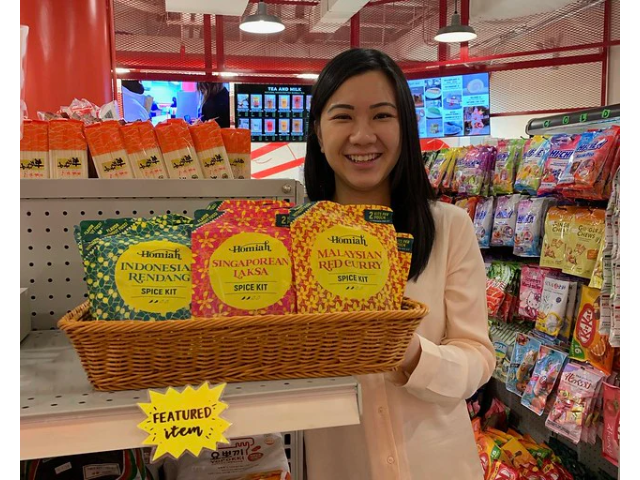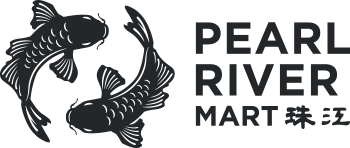
Michelle Tew of Homiah: Spreading the Spice of the Good Life
We're so excited to welcome the newest member of the Pearl River Mart Foods family: Michelle Tew, founder of Homiah.
Homiah offers South East Asian-inspired spice and sauce kits designed to give your meals a little extra sumpin sumpin. We had the chance to talk to Michelle about how she grew up, the challenges of starting a company during the pandemic, and what exactly homiah means.
Tell me about your background. Where did you grow up? What was your childhood like?
I grew up in Malaysia and came to the U.S. for college. My family is Nyonya, also known as Straits Chinese, a unique hybrid culture dating back to the first waves of Southern Chinese immigrants to maritime Southeast Asia and local cultures in the Malay Archipelago (parts of Malaysia, Singapore, and Indonesia). It's a colorful culture especially famous for its complex food. Making it is a super laborious process which is done by women. It involves a lot of grinding and smashing together of local spices.
Did you grow up in a cooking family?
My mother cooks of course, but my grandmother was a famous cook and the genesis of this story. She was actually one of the first women in Penang to codify Nyonya recipes. I grew up cooking from quite young — and cooking well was sort of expected for women in Nyonya culture, so there was always a big emphasis on what I was learning to cook or bake.
When I came to the U.S., I found that I really missed the food from home. I was always smuggling in loads of spices in my luggage bag. I didn't know that the kind of food I was cooking was special. All I knew was that I missed them. I would cook some of these foods in my Columbia dorm room and discovered people really liked eating what I made. That's what started Homiah: my grandmother's recipes. I decided to take the plunge and begin my own business.
Can you describe Homiah for those who aren't familiar with it?
Homiah makes heritage-inspired sauces and spices from Southeast Asia. Specifically, the food is inspired by Nyonya culture which I think really represents the beauty of hybrid cultures, something very typical of Southeast Asia. What I did was take my grandmother's recipes, go back to Malaysia, and do the production myself. I made these instant sauces as a recreation of my grandmother's. I worked on them for three months last year, and they just arrived a month ago.
They come in individual packs of sauces and spices. While the flavors stay true to their original heritage, I tried to adapt to the times and modern consumers with gluten-free and reduced oil content. Pearl River will be one of our first retailers.
Did you grow up cooking?
I did until I was about 17 or so. All the women around me had spent their lives cooking. The idea is to live to feed those around you, literally and emotionally. Until I was 16, I didn't think that I would do anything else as an adult. I thought I would be like the women I knew — a homemaker, raising kids, and feeding the community. Only later after I had left and gone abroad, I realized that maybe there were other things I wanted to do.
But the idea of cooking has always been deeply ingrained. I flew back to Malaysia to be an apprentice to a laksa chef. As I grew older, when I went to business school and was in the corporate world, what I was studying and experiencing in the professional world clicked with my love of food and cooking.
What's your fondest food memory from when you were a kid?
I have many favorite memories. When I was a little girl, I remember coming back home on my birthday and finding that my mom had made me a cake that was in the shape of a house. I just remember being in awe as a little kid, seeing this beautiful house-shaped cake, and at the moment I was somehow reassured that I was loved. The fact I turn to this lingering memory often has reminded me that there is an importance in expressing love by cooking and feeding others. You can alter the course of their memories and quality of life.
Where does the name "Homiah" come from?
It comes from the Nyonya language, a dialect called Hokkien, and means "good life." It's a very common word and expresses how someone feels when they're taken care of. If you get married and he's taken care of well, people say, "Look at him and his new wife — isn’t he homiah now eating three home-cooked dishes a day?" My mission is to make everyone homiah, and to enrich people's lives through food, both physically and emotionally.
What has it been like as a small business owner during the pandemic?
It's been crazy. When I first flew back to Malaysia last summer, I had no supply chain, no manufacturers. The country was under serious lockdown. I had to quarantine for three weeks. Whenever I wanted to leave the house — for instance, I was sourcing not from the capital city but closer to Nyonya areas — I had to get a police report every time. Then when I finally found someone to work with, he went into the ICU with covid and everything was halted. The packaging printer had a covid closure, and freight costs had gone up so much.
During this journey, I did wonder if my dream of enriching people was worth it. Maybe I should just enrich myself. But I learned so much from it. I really loved it despite the challenges, and seeing all of this come to life.
What's your go-to comfort food?
My comfort food is probably not comfort food for most people in the U.S. I really like assam laksa, a very, very, very sour noodle dish. It's made by boiling a whole fish and adding tamarind. It's a hard dish to make. The master chef that I apprenticed with — this was what he was making. The fish depends on the region. For instance, with a mackerel, you have to get all the bones out, and squeeze all the tamarind out into a curry broth. It's really a labor of love and has a unique taste.
During the pandemic, I happened to score a whole mackerel from Whole Foods and made assam laksa in my kitchen. It gave me a sense of stability, a taste of uniqueness that brought me back to childhood. The feeling that some things don't change and everything is okay. I think that's why people turned more toward comfort foods when stuck at home and dealing with so much change.
What would you choose for your last meal on earth?
I would have a giant platter with laksa, a whole Japanese omakase, and pasta. So lot of carbs. [Laughs]
What's a food city that you've been missing and would like to visit again?
Penang in the north of Malaysia. It's a culturally vibrant island known as a food mecca and very much a destination for foodies. It can be overwhelming. All you do is eat.
What's something you're obsessed with now? Something you tell people you must eat/read/watch/listen to this?
I'm into making jam and pickles. It occurred to me how easy it is to throw in a bunch of fruit and make jam. Chili jam and alcoholic jam. I recommend everyone should do it. Once you make your own jam, you never really go back. Oh, I’m also obsessed with the new Netflix show Old Enough! — it's a sort of mini reality show starring tiny Japanese kids going on errands for the first time. Heart melting.
What's your favorite memory of Pearl River?
When I first arrived at Columbia, Pearl River was the first store I went to for things to furnish my mini dorm. I Googled, "Where do I find Asian utensils?" and Pearl River popped up. I remember going in there and picking out several bowls. The first chopsticks that I bought in America were from Pearl River Mart.
Hungry for more? Check out Homiah’s spice and sauce kits. You can also read more of our entrepreneur interviews.